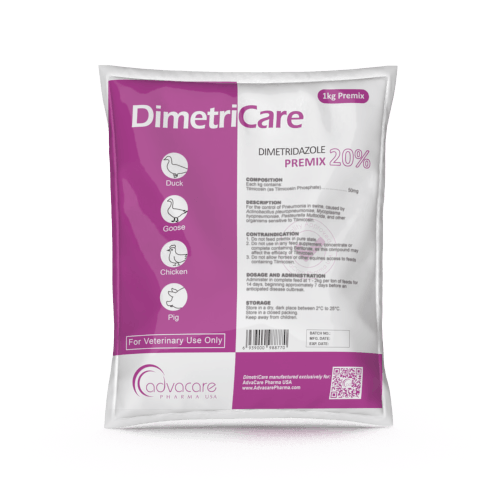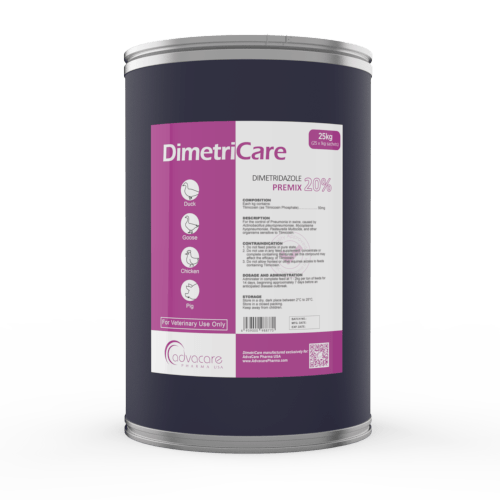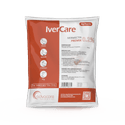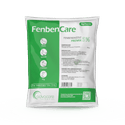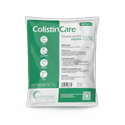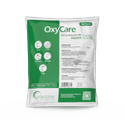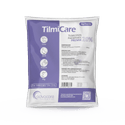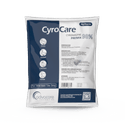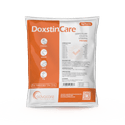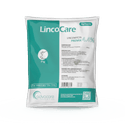- Home›
- Veterinary Pharmaceuticals›
- Veterinary Powders and Premixes›
- Veterinary Premixes›
- Dimetridazole Premix
Dimetridazole Premix
Dosage
Packaging
What is Dimetridazole?
Active Ingredients: Dimetridazole
Dimetridazole Premix is an anthelmintic drug used to treat certain protozoan infections. It is indicated for the treatment of hemorrhagic enteritis and trichomonas dysentery in pigs, tissue trichomoniasis in chickens, and genital trichomoniasis in cows. It is also used to treat histomoniasis in turkeys and infections caused by Campylobacter in pigs.
Dimetridazole is classified as a nitroimidazole. It's thought to work by inhibiting nucleic acid synthesis. This drug belongs to the 5-nitroimidazoles group of drugs that have both antiprotozoal and antibacterial activity. Dimetridazole can control histomoniasis in poultry, while several nitroimidazoles have activity against trypanosomes. This drug is also active against anaerobic bacteria.
When administered orally, Dimetridazole is absorbed in the gastrointestinal tract. The rate and extent of absorption may vary depending on the formulation and the specific animal species. Dimetridazole is distributed widely in the body, and it can penetrate various tissues, including the liver. It may cross the blood-brain barrier and reach therapeutic concentrations in the central nervous system. This drug undergoes extensive hepatic metabolism. The primary metabolic pathway involves the reduction of the nitro group, leading to the formation of several metabolites. The excretion of dimetridazole and its metabolites occurs mainly through the urine. In some species, such as poultry, dimetridazole metabolism may lead to the formation of metabolites that have been associated with potential toxic effects. Various factors can influence the pharmacokinetics of dimetridazole, including the health status of the animal, concurrent medications, and individual variations in drug metabolism.
It is important to note that this drug is for veterinary purposes only. Dimetridazole Premix should be prescribed by a veterinary doctor or animal care specialist for an animal.
AdvaCare Pharma is a global distributor of Dimetridazole Premix. AdvaCare excels at the production of high-quality yet cost-effective veterinary supplies and medicines. This product has been manufactured in our GMP-certified facilities located in China, India, and the USA.
Why are we a top Dimetridazole manufacturer?
AdvaCare Pharma is a reputable and leading manufacturer of Dimetridazole Premix. Our product range of 250+ veterinary medicines are customized and adapted to address the market requirements of our veterinary distributors. We provide unparalleled assistance throughout the entire journey - including support with documentation and product registration. By adhering to strict GMP standards, we ensure that the manufacturing of our Dimetridazole Premix and 30+ other veterinary premixes and oral powders are efficacious and of reliable quality.
Uses
What is Dimetridazole used for?
It's used to treat or prevent infections caused by microorganisms. It is indicated for the treatment of infections like:
- Trichomonas dysentery in pigs
- Hemorrhagic enteritis in pigs
- Campylobacter infection in pigs
- Histomoniasis in turkeys
- Trichomoniasis in pigeons
- Genital trichomoniasis in cattle
What animals can be treated with Dimetridazole Premix?
This medicine is recommended for pigs, cows, and poultry.
How is Dimetridazole Premix used?
This product has been manufactured as powder, which is intended to be mixed into feed. The product should be used immediately when mixed with feed. It should be used as soon as possible, and proper hygiene measures must be maintained.
Can Dimetridazole Premix be given to pregnant and lactating animals?
Dimetridazole does not have any potential carcinogenic effects. The country’s regulatory restrictions must be met when giving this drug.
How can Dimetridazole Premix help in animals with histomoniasis?
Histomoniasis is also known as the blackhead of infectious enterohepatitis caused by the protozoan Histomona meleagridis and is transmitted from sick and carrier birds. It can also be caused by the cecal worm Heterakis gallinarum indirectly. This disease causes huge economic losses in turkeys if not treated properly. Some chickens can become resistant and loss in body weight is noticeable. Dimetridazole can help in preventing and treating histomoniasis in poultry. Maximum improvement in growth rate and feed efficiency was provided by 0.01 to 0.1% feed concentrations of Dimetridazole for turkeys and 0.0125 to 0.05% feed concentrations for chickens. Dimetridazole feed concentrations between 0.01 and 0.1% provided maximum blackhead preventive efficacy in both chickens and turkeys.
When treating the animals with Dimetridazole, the signs of listlessness can be treated. The appetite of the animals can normalize. This drug can also reduce the symptoms of drooping wings, unkempt feathers, and yellow fecal droppings in the later stages of the disease. The disease must be treated on time, in order to achieve good results.
Is only Dimetridazole Premix enough for treating histomoniasis in animals?
Historically, nitroimidazoles have been proven the most effective in the prevention and treatment of Histomoniasis. Besides Dimetridazole, other drugs can also be combined, including vitamins and minerals, to speed up the healing process.
Healthy and sick animals should be separated in order to avoid further infections. This is because healthy poultry often carry the cecal worm vector. Proper hygiene practices must be kept. Turkeys should be separated from chickens. Another measure that can help in preventing the disease is immunization.
How can Dimetridazole Premix help in treating trichomonas dysentery in pigs?
When given Dimetridazole, it can relieve the symptoms of diarrhea. The severity of diarrhea can be reduced. If the diarrhea is addressed, the dehydration symptoms can be prevented. Animals can return to their normal appetite, and weight loss can be prevented. Prompt treatment can prevent rectal prolapse and hemorrhagic colitis in animals affected with trichomonas dysentery.
How can Dimetridazole Premix help cattle with genital trichomoniasis?
Genital trichomoniasis is a venereal disease that manifests with early fetal death and infertility. The most common control is culling the infected animals; however, nitroimidazoles are often used. Be aware that bulls can be susceptible to reinfections after successful treatments. Tritrichomonas foetus can be eliminated from the semen of the animal with Dimetridazole. The best control is by eliminating the infection by culling and replacement with virgin bulls.
Is only Dimetridazol Premix enough for treating cattle with genital trichomoniasis?
This drug can help in eliminating Tritrichomonas foetus from the animals' semen. Using artificial insemination as a reproductive strategy can decrease the risk of reinfection. It is recommended to keep the infected cattle away from the healthy animals.
How should Dimetridazole Premix be stored?
This medication should be stored in a dark, dry location under 30°C.
Is there a withdrawal period after treatment with Dimetridazole?
The withdrawal period is 3 days. Different countries have different withdrawal periods, so check the country’s regulations before administering this drug.
Dosage
How much Dimetridazole Premix should be given to swine?
The usual dose for pigs is 1000-2500g mixed with 1000kg feed.
How much Dimetridazole Premix should be given to poultry?
The usual dose for chickens is 400-2500g mixed with 1000kg feed. Do not use for more than 10 days in a row.
The dosage of Dimetridazole Premix depends on the animals’ species, current health condition, weight, and age. It also depends on the current physiological state. Pregnant and lactating animals might need lower dosages than other animals.
Refer to a veterinary doctor or pharmacist for guidelines on dosage.
Side Effects
As with all pharmaceuticals, some unwanted effects can occur from the use of Dimetridazole Premix.
Adverse effects are not well documented for this drug. Some serious side effects may include carcinogenic effects on eggs laid by animals being treated with Dimetridazole.
Gastrointestinal side effects might occur after administering this drug. If you notice vomiting, diarrhea, constipation, or stomach upset after administering this drug, contact a veterinarian.
For a comprehensive list of all possible side effects of this medication, consult a veterinarian.
Precautions
Do NOT use Dimetridazole Premix for an animal that:
- has a known allergy or hypersensitivity to any of the ingredients.
- is a chicken in the laying period.
Treatment with this drug should be administered with caution if the animal is pregnant or lactating. There is no substantive evidence concerning the effects on pregnant or lactating animals. The veterinarian should decide if the animal’s current health status, pregnancy, and lactation allow the administration of this drug.
Repeated treatment with this drug may lead to resistance. Rotation with other anticoccidials therapies is recommended.
Avoid direct contact with skin or eyes. Wear protective gloves and glasses when handling this product.
Keep the drug out of reach of children and animals.
What are the most common animals for which Dimetridazole Premix is used?
Dimetridazole Premix is primarily utilized for the treatment of parasitic infections in cows, poultry and pigs. The specific common uses of Dimetridazole Premix include the treatment of the following:
- Pigs with Trichomonas dysentery
- Pigs experiencing Campylobacter infections
- Turkeys affected by Histomoniasis
- Pigeons suffering from trichomoniasis
- Cattle suffering from genital trichomoniasis
Cattle Protozoan Infections
Dimetridazole Premix in cattle is mostly used for treating genital trichomoniasis in infected animals. This drug can eliminate Tritrichomonas foetus from the animal’s semen if treated on time. Additional infections in the animal’s herd can be stopped with proper treatment.
Pig Protozoan Infections
Trichomonas dysentery in pigs is mostly treated with Dimetridazole Premix. This drug can reduce gastrointestinal symptoms and lead to better overall health in animals.
Poultry Protozoan Infections
Histomoniasis or blackhead in turkeys can be treated with Dimetridazole. It is one of the most recommended drugs for treating this disease.

You might be interested in...
Why AdvaCare Pharma?
As an industry leader, we are aware of our responsibility to provide affordable and sustainable solutions to improve healthcare worldwide.
